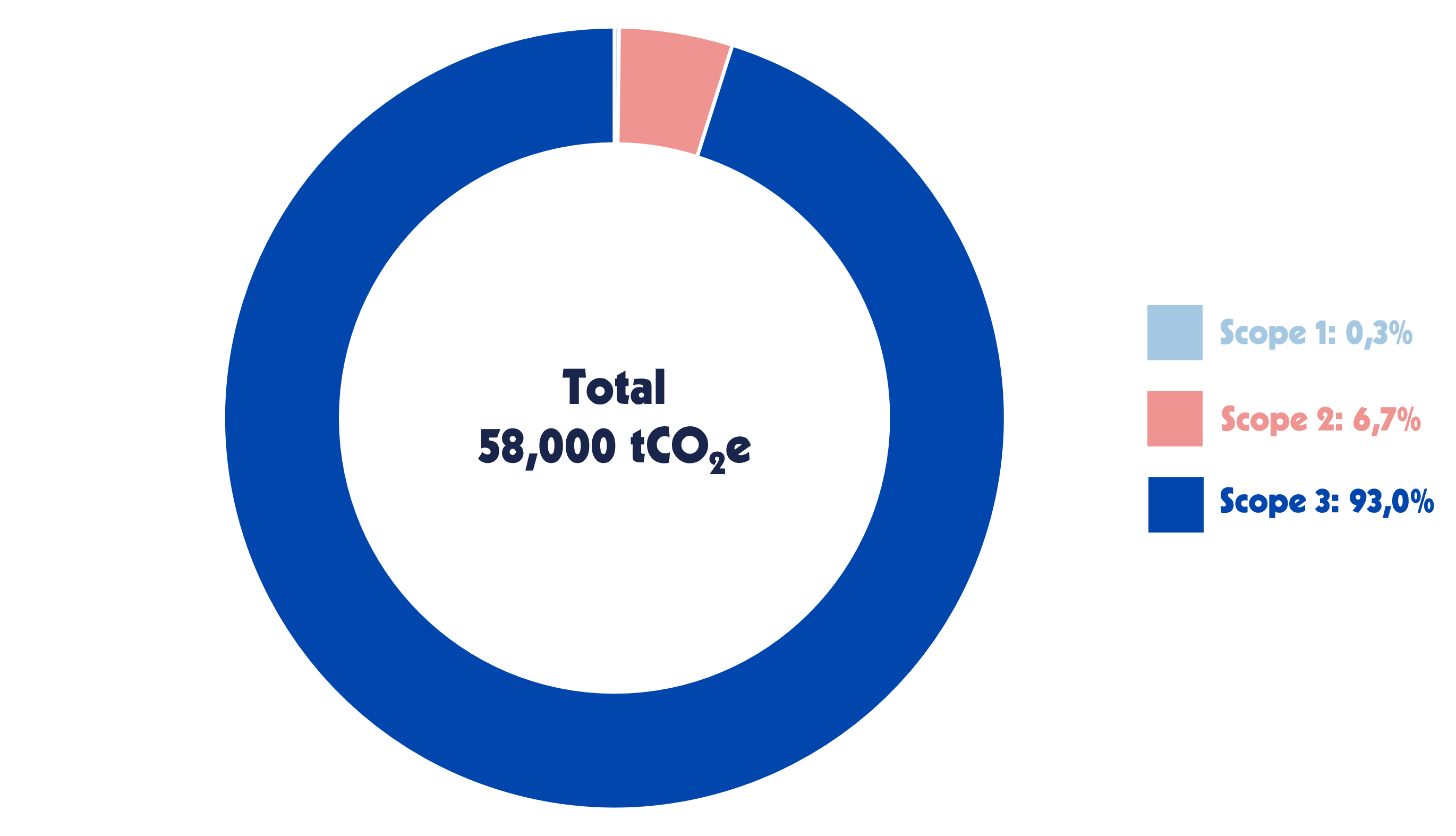
Sustainable consumption and climate action
Terveystalo is committed to the targets agreed upon at international climate summits for the mitigation of climate change. Terveystalo’s goal is zero emissions from its own operations in 2030. Terveystalo has committed to the Science Based Targets initiative (SBTi) and will set science-based short- and long-term emissions reduction targets by 2027. Terveystalo promotes the conservation and sustainable use of natural resources in its supply chains by minimising the generation of waste in all of its operations and forwarding all waste to be recovered. Terveystalo’s digital services enable Terveystalo to simultaneously improve access to care and reduce the emissions generated by unnecessary travel.
Environmental policy and ISO 14001:2015 environmental management system certification
Terveystalo’s environmental policy describes the environmental principles that all employees, managers, officers, board members, consultants, and other personnel under the leadership of the Terveystalo Group are expected to adhere to. Terveystalo operates in accordance with sustainable development principles to prevent and reduce harmful impacts on the environment. In addition to the Group's environmental policy, Terveystalo is committed to fully complying with applicable laws, regulations and industry practices that ensure work and patient safety, and to continuously improve environmentally friendly practices.
Terveystalo’s long-term environmental goals include, among other things:
- The development of environmental management and awareness at all organisational levels
- Increasing awareness of environmental impacts arising from our daily activities
- Identifying, anticipating, minimising environmental impacts, maximising positive environmental impacts, and transparently monitoring direct and indirect environmental impacts
- Developing and implementing practices that promote and ensure sustainable development
Read more about Terveystalo's sustainability management here: Ethical Business
Terveystalo's ISO 14001 certified environmental management system covers all healthcare services segment locations (a total of 203 locations) in Finland, and its appropriateness is assessed through quality and environmental system audits. ISO 14001 is an international standard for environmental management that helps us systematically identify, manage, and reduce our direct and indirect environmental impacts. In other locations, the same practices and environmental system are followed, although they are not directly within the scope of the certification. Each location prepares its own annual environmental programme, which is regularly monitored by the environmental system's operational working group. Locations and Terveystalo staff are regularly trained on environmental responsibility, and best practices are shared through common communication channels. In Sweden, 90% of Feelgood's controlled locations are also certified according to ISO 14001.
Terveystalo recognises, manages, and prevents its environmental impacts through the following measures:
- Reducing energy consumption and transitioning to lower-emission energy sources
- Reducing the amount of waste generated by our operations and increasing our recycling rate
- Optimising the life cycle of healthcare equipment considering technological advancements
- Taking environmental considerations into account in travel and car policies
- Developing digital services and digital interactions
- Planning and implementing pharmaceutical management in a timely manner
- Incorporating environmental considerations in centralised procurement and ensuring efficient inventory management
- Considering sustainable development and environmental aspects in network and business premises projects
Terveystalo's climate work
In 2024, Terveystalo advanced its sustainability work and focused on understanding and considering the impacts of its value chain. Among other things, at the end of 2024, Terveystalo conducted a comprehensive human rights impact assessment across its entire value chain. Terveystalo developed its human rights policy based on the assessment and enhanced its emissions calculations to be more comprehensive. For the first time, Terveystalo calculated its indirect Scope 3 emissions mostly on a spend-based approach considering all material categories. With more comprehensive emissions calculations, Terveystalo committed in January 2025, as the first Finnish healthcare provider, to set science-based near- and long-term emission reduction targets in accordance with the Science Based Targets initiative (SBTi). Terveystalo will set and publish both targets by 2027. Terveystalo’s near-term targets will cover at least 90% of Terveystalo's direct and indirect Scope 1 and 2 emissions and include its current goal of zero emissions from its own operations by 2030. The near-term targets also account for at least 67% of indirect Scope 3 emissions. The long-term targets will cover at least 95% of Scope 1 and 2 emissions and 90% of Scope 3 emissions. Terveystalo will share more information about the targets during 2025. Read more about the Science Based Targets initiative here: Science Based Targets initiative.
More information about the Terveystalo’s climate work from 2024 can be found in the Environmental Appendix published in conjunction with the Annual Report 2024, on pages 190-196. The Annual Report also contains information about Terveystalo's previous set climate targets and metrics. Please note that Terveystalo updates its climate targets and calculated greenhouse gas emission data on its website as the calculations are refined, and therefore the information reported in the Environmental Appendix of the 2024 Annual Report may differ from that published on the website
Terveystalo’s Carbon Footprint
With more comprehensive emissions calculations, Terveystalo can better understand its direct and indirect environmental impacts. This information also supports Terveystalo in setting emission reduction targets for the near and long term. Based on 2024 calculations, Terveystalo’s direct Scope 1 emissions were only 0.3 percent of its total emissions. Indirect Scope 2 emissions accounted for 6.7 percent, and Scope 3 emissions made up 93.0 percent. Therefore, Terveystalo can conclude that the majority of its climate impacts arise indirectly through its operations in the upstream value chain.

Scope 1
Terveystalo’s Scope 1 emissions mainly consist of emissions from its managed fleet and vehicles used in imaging services. Terveystalo generally does not own or manage the properties in which it operates. The emissions from its own and company-managed journeys were calculated in 2024 based on fuel consumption or kilometres driven. Of the calculated emissions, 15.7 percent were estimated using average fuel price coefficients in Finland (euros/litre). In 2024, Scope 1 CO2 emissions in Finland amounted to a total of 107 tCO2e. In Sweden, Scope 1 emissions were 61 tCO2e.
Scope 2
Indirect Scope 2 emissions arise from the consumption of electricity for electric vehicles and energy consumption in properties. In 2024, Terveystalo procured a total of 16,586 MWh of electricity for properties it manages in Finland and 16.2 MWh of electricity for the company's electric vehicles. Since the beginning of 2020, the company’s electricity portfolio (electricity procured for properties) has consisted of renewable energy or nuclear power ("green electricity"). For the consumption year 2024, Terveystalo procured a total of 12811 MWh of green electricity in Finland, accounting for approximately 77 percent of the company’s electricity consumption in Finland. A total of 3,775 MWh of electricity was procured for properties outside the company’s electricity portfolio, corresponding to 2,134 tCO2e (market-based) Scope 2 emissions. In Sweden, Feelgood procured 1,751 MWh of electricity for managed properties, of which approximately 80 percent was green electricity. Market-based Scope 2 emissions from purchased electricity and electric vehicle charging in Sweden amounted to 23.4 tCO2e.
Scope 3
For indirect Scope 3 emissions, Terveystalo reported and considered the following material categories according to the GHG Protocol in 2024:
- Purchased goods and services
- Capital goods
- Fuel and energy-related activities not included in Scope 1 and 2 calculations
- Upstream transportation and distribution
- Waste
- Business travel
- Leased assets
In 2024 the total Scope 3 emissions were 53,529 tCO2e. The majority of Scope 3 emission categories were calculated based on spend. Emissions from IT equipment in the category “1. Purchased goods and services” were calculated based on product-specific available information. Categories “5. Waste” and “6. Business travel” were calculated based on quantity, consumption, or weight. Terveystalo will add the category “7. Employee commuting” to the calculations in 2025 to cover employee commuting to the workplace. Information was not available at the time of calculation, so in spring 2025, the company will investigate the emissions related to employee commuting by examining the prevalence of remote work, the typical modes of transportation used by employees, and the length of commutes.
Terveystalo strives to avoid unnecessary work-related travel by favouring remote meetings whenever possible. In 2024, Terveystalo’s personnel accrued 0.8 million air kilometres from work-related travel, corresponding to 110.6 tCO2e Scope 3 emissions. Terveystalo’s personnel accrued 1.7 million kilometres of reimbursed work-related travel in Finland, corresponding to 285.1 tCO2e Scope 3 emissions. Terveystalo encourages its employees to choose low-emission company vehicles. The company vehicles used in Finland had an average emission rate of 27 g CO2e/km. Scope 3 emissions from work-related air travel by Swedish personnel amounted to 41.6 tCO2e. In total, all work-related travel by Swedish personnel resulted in 158.8 tCO2e Scope 3 emissions.
In the healthcare sector, waste generation is inevitable, as hygiene and safety are of paramount importance in operations. Therefore, waste generation is necessary, and the methods to reduce waste focus mostly on specific measures, such as life cycle management, packaging materials, improving recycling options for non-urgent care, and reducing waste. Terveystalo aims to minimise the generation of mixed waste in all company operations and to deliver as much waste as possible for reuse. Indirect Scope 3 emissions from waste (considering Terveystalo locations for which information on Terveystalo's waste fractions is available) in Finland were 36.0 tCO2e in 2024. Waste quantities and the resulting emissions from operations in Sweden were very low, amounting to 1.4 tCO2e, as waste is mainly generated in offices.
Materials used and waste
A key theme in Terveystalo's environmental responsibility is the recycling and reuse of waste, with the goal to minimise the generation of mixed waste in all Terveystalo operations and to deliver as much waste as possible for reuse. Terveystalo is committed to reducing plastic waste generated by its operations in accordance with the EU's plastic strategy, by improving recycling and reviewing supplier packaging options whenever possible. Separate waste collection is crucial for Terveystalo's environmental goals. Terveystalo also closely monitors its pharmaceutical waste, which is reduced by improving inventory management. There are situations in Terveystalo's operations where safety and hygiene must take precedence over waste reduction and reuse.